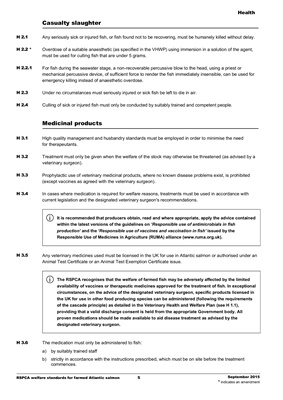
Health
RSPCA welfare standards for farmed Atlantic salmon 5 September 2015
* indicates an amendment
Casualty slaughter
H 2.1 Any seriously sick or injured fish, or fish found not to be recovering, must be humanely killed without delay.
H 2.2 * Overdose of a suitable anaesthetic (as specified in the VHWP) using immersion in a solution of the agent,
must be used for culling fish that are under 5 grams.
H 2.2.1 For fish during the seawater stage, a non-recoverable percussive blow to the head, using a priest or
mechanical percussive device, of sufficient force to render the fish immediately insensible, can be used for
emergency killing instead of anaesthetic overdose.
H 2.3 Under no circumstances must seriously injured or sick fish be left to die in air.
H 2.4 Culling of sick or injured fish must only be conducted by suitably trained and competent people.
Medicinal products
H 3.1 High quality management and husbandry standards must be employed in order to minimise the need
for therapeutants.
H 3.2 Treatment must only be given when the welfare of the stock may otherwise be threatened (as advised by a
veterinary surgeon).
H 3.3 Prophylactic use of veterinary medicinal products, where no known disease problems exist, is prohibited
(except vaccines as agreed with the veterinary surgeon).
H 3.4 In cases where medication is required for welfare reasons, treatments must be used in accordance with
current legislation and the designated veterinary surgeon's recommendations.
It is recommended that producers obtain, read and where appropriate, apply the advice contained
within the latest versions of the guidelines on 'Responsible use of antimicrobials in fish
production' and the 'Responsible use of vaccines and vaccination in fish' issued by the
Responsible Use of Medicines in Agriculture (RUMA) alliance (www.ruma.org.uk).
H 3.5 Any veterinary medicines used must be licensed in the UK for use in Atlantic salmon or authorised under an
Animal Test Certificate or an Animal Test Exemption Certificate issue.
The RSPCA recognises that the welfare of farmed fish may be adversely affected by the limited
availability of vaccines or therapeutic medicines approved for the treatment of fish. In exceptional
circumstances, on the advice of the designated veterinary surgeon, specific products licensed in
the UK for use in other food producing species can be administered (following the requirements
of the cascade principle) as detailed in the Veterinary Health and Welfare Plan (see H 1.1),
providing that a valid discharge consent is held from the appropriate Government body. All
proven medications should be made available to aid disease treatment as advised by the
designated veterinary surgeon.
H 3.6 The medication must only be administered to fish:
a) by suitably trained staff
b) strictly in accordance with the instructions prescribed, which must be on site before the treatment
commences.
i
i